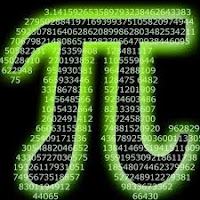A complex number is a NUMBER that can be expressed
in the form a + bi, where
a and b are Real
numbers and i is
the Imaginary unit that satisfies
the equation x2 = −1, that
is, i2 = −1.[1] In this expression, a is the real part and b is
the imaginary part of the
complex number. The complex number a + bi can
be identified with the point (a, b) in
the complex plane
A Complex Number is a combination
of a Real Number and an Imaginary Number
Imaginary number:
The ordered
pair (0, 1) is denoted by the letter i , read as “IOTA”. Then , i2 = i.i
= (0, 1) . (0, 1)
= (-1, 0) ∈ Complex
= -1 ∈ R
so .i= √-1.
 “i” is called an imaginary number because
there is no real number x satisfying the property x2 =
-1.
“i” is called an imaginary number because
there is no real number x satisfying the property x2 =
-1.
The
number of the form ib is called an imaginary number,∀b ∈ R.



















